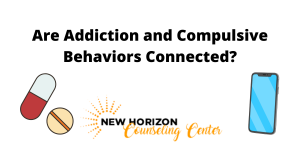
Addiction and compulsive behaviors share some familiar features, but they are not the same. Both involve losing control, obsessive thoughts, and continued use despite negative consequences. Compulsive behavior is defined as repetitive, ritualistic behavior that a person feels compelled to do. This could include behaviors like skin picking, hair pulling, excessive hand-washing, or anything else that a person feels they need to do to feel “normal.” These behaviors are usually done in response to anxiety or stress. Addiction can be defined as a chronic, relapsing disorder characterized by compulsive drug seeking and use despite negative consequences. It is not simply a matter of using more of a substance than intended or using it for longer than intended; it is also about continued use despite negative consequences such as job loss, financial problems, relationship problems, and legal trouble. New Horizon Counseling Center is strongly committed to helping people struggling with addiction and compulsive behaviors.
- Share a common cause.
It’s no secret that addiction and compulsive behaviors share a lot. After all, both involve an intense focus on certain activities or substances, which can cause severe damage to your health and wellbeing. However, what you may not realize is that these two conditions also share a common cause: a chemical imbalance in the brain. This imbalance can cause problems with regulating mood and impulsive behavior, which can lead to addiction or compulsive behaviors. Fortunately, there are treatments available at New Horizon Counseling Center that can help to correct this imbalance and reduce the risk of developing these conditions.
- Both involve loss of control.
One of the most notable similarities between addiction and compulsive behaviors is that both involve a loss of control. This means that you may find yourself using substances or engaging in activities even when you don’t want to, and you may feel unable to stop despite the negative consequences. If you are struggling with either of these conditions, it’s essential to seek professional help as soon as possible. New Horizon can provide the treatment and support you need to regain control over your life.
- Addiction is a physical disease, while compulsive behaviors are psychological.
Both involve losing control, obsessive thoughts, and continued use despite negative consequences. However, there are important differences between the two. Addiction is a chronic disease that affects the brain’s reward systems. This means that people with addiction have a physical dependence on their substance of choice, and they will experience withdrawal symptoms if they try to stop using. On the other hand, compulsive behaviors are not associated with physical dependence or withdrawal. Instead, they are characterized by an irresistible urge to perform a certain behavior, even if it is harmful. People with compulsive behaviors often engage in their behavior to relieve anxiety or stress. While addiction and compulsive behaviors both involve loss of control, the key difference is that addiction is a physical disease while compulsive behaviors are psychological.
The good news is that both addiction and compulsive behaviors can be treated. At New Horizon Counseling Center, we offer a variety of evidence-based treatments that can help you regain control over your life.
We understand the connection and differences between addiction and compulsive behavior, and we are here to help. We offer a variety of counseling and therapy services to help people struggling with addiction and compulsive behaviors overcome and develop healthy coping mechanisms for dealing with stress and trauma.


